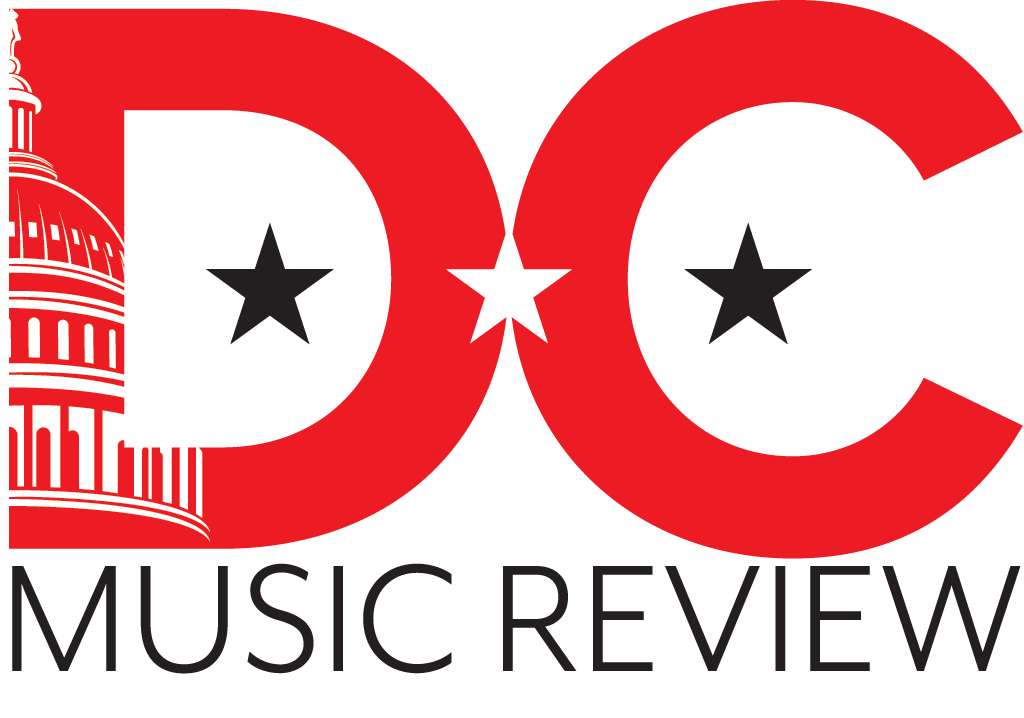On December 9th, 2022, the new Culture Wing at the Smithsonian's National Museum of American History opened to the public. The expansive Ray and Dagmar Dolby Hall of American Culture now houses the new "Entertainment Nation / Nacion del Espectaculo" exhibit.
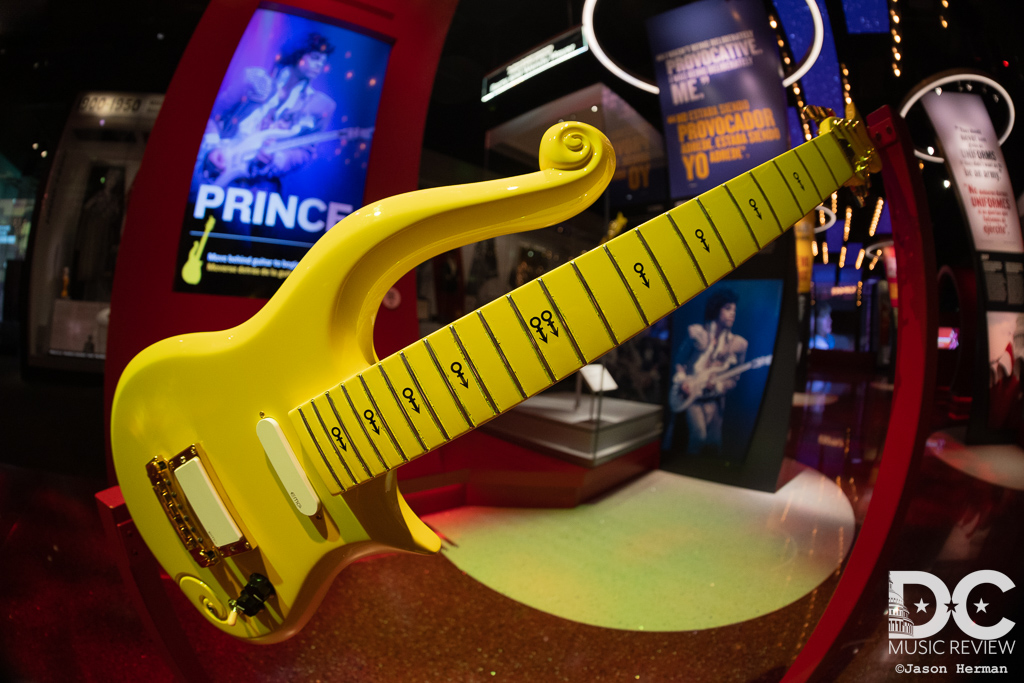
This new exhibit is the first dedicated exploration of entertainment history and will be a must-see attraction for any pop history fan. Where else can you play a replica of Prince's "Yellow Cloud" guitar or walk on a piece of the mythical Woodstock stage? You may not have witnessed Woodstock, but now you can walk upon an actual piece of Woodstock stage, turn around and see the guitar that Jimi Hendrix played at Woodstock hanging only a few feet away from you. You can also find a necklace worn by Nipsey Hussle or a turntable used by Grandmaster Flash. These are just a few items of musical significance that we point out amongst hundreds of historical artifacts. Trust us when we say that this exhibit is a “must-see'' for any music lover or lover of pop history. Even if you have been to this National American History Museum before, this newly curated exhibit is sure to delight you and others in every possible way. Head through the entrance of the museum and then straight upstairs to the 3rd floor to see this breathtaking and exhaustive exhibit of sports and entertainment in America.

Coinciding with the opening of this new culture wing was the James Smithson Bicentennial Medal presentation to four musicians recognized for their contribution to American Culture and the Arts through music - Gloria Estefan, Emilio Estefan, Dave Grohl, and Susan Tedeschi.
Each of these artists' careers spans multiple decades, and their music is deeply entrenched and interwoven into the fabric of American culture. The music of superstar Latin pop couple Gloria Estefan and Emilio Estefan's Miami Sound Machine is instantly recognizable and makes anyone want to start dancing and captures their heart with emotion. Dave Grohl is a hometown hero hailing from Springfield, Virginia, and has established himself as a worldwide musical icon as a member of Nirvana and Foo Fighters. Finally, Susan Tedeschi, first with her namesake band, Susan Tedeschi Band, and then with Tedeschi Trucks Band, is a torchbearer for the blues and has been captivating fans around the globe with her powerful voice and guitar.
Before the ceremony, honorees could be seen walking the new exhibition hall and taking in the exhibit with the same enthusiasm as museum-goers would do the following day. Despite these four artists having a massive and profound impact on American and worldwide music, they each came from disparate musical backgrounds and could be seen introducing themselves to one another as their music careers finally intersected. From an outsider's perspective, it looked as though Susan Tedeschi, Derek Trucks, and David Grohl were becoming fast friends with mutual admiration for one another. Meanwhile, journalists from Telemundo broadcasting beamed with pride as they eagerly anticipated the award ceremony and the honor bestowed upon Gloria and Emilio Estefan. After the award ceremony, Telemundo was found interviewing the Estefans in front of the dress Gloria wore in the 1987 music video for "Rhythm Is Gonna Get You" and Emilo's conga - all parties radiating with pride.
The ceremony was hosted by Dr. Anthea M. Hartig, Director of the National Museum of American History and the first woman to hold the post since the museum opened in 1964. After some brief opening remarks, Hartig would introduce Dr. John Troutman, one of the curators from the Division of Cultural and Community Life at the National Museum. Troutman quickly said what everyone in attendance was thinking "I just want to take a moment to acknowledge that most of us don't normally get to have so many of our musical heroes in one room."
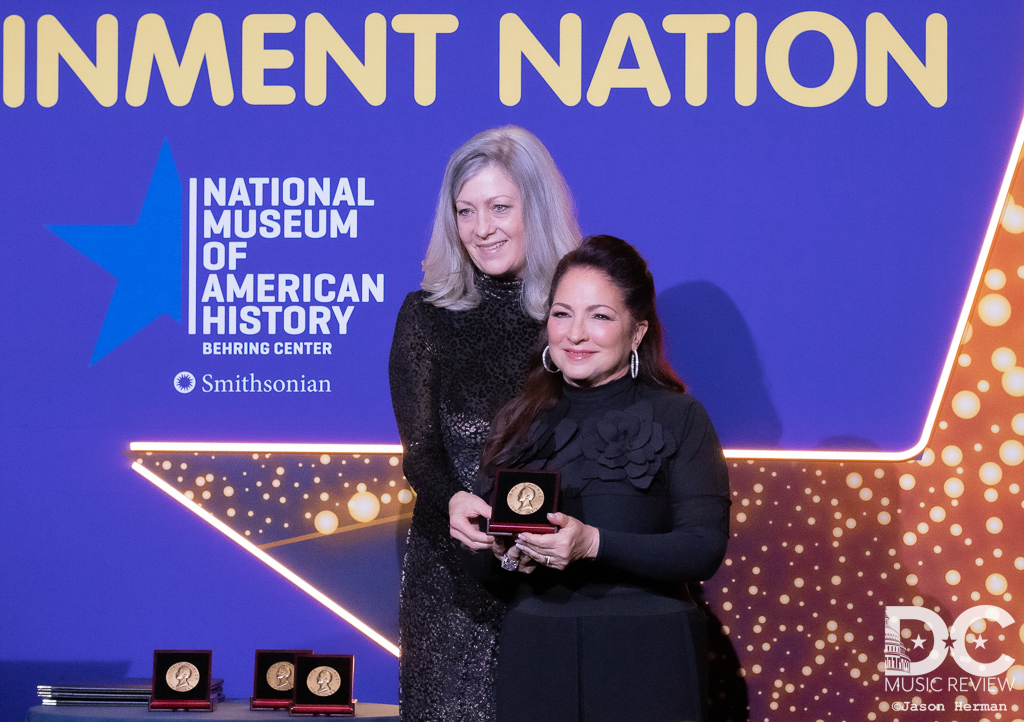
Dr. Anthea M. Hartig and Gloria Estefan
In honoring Gloria and Emilio Estefan, Troutman remarked that “Gloria’s voice was exciting and infectious, inviting us all to join the revelry of music that took no prisoners, and was determined to unify the Western Hemisphere and improve that was rooted in tradition with a thirst for breaking down any barriers to reform.” Troutman reminded us, if not reinforced, the profound cultural impact that the Estefan's had in the United States and abroad - three Grammy awards, 38 number-one hits, 100 million records sold, two performances at the Superbowl, recording the official song of the 1996 Atlanta Summer Olympics that Gloria Estefan performed during the Olympic closing ceremonies, and Gloria Estefan's 2015 Presidential Medal Of Freedom. Dr. Hartig continued to lavish praise on Gloria Estefan and concluded her remarks by saying, “the Smithsonian Institution proudly presents the James Smithson bicentennial medal to Gloria Estefan. From her singing for solace to infusing the world with her sound, for her generosity of spirit, shaped by inner courage and resilience, and her devotion to family and the global community. With a commitment to philanthropy and the arts. Through the expression of these values and achievements, she has contributed to the fulfillment of James Smithson's mandate for the increase and diffusion of knowledge.”

Dr. Anthea M. Hartig and Gloria Estefan
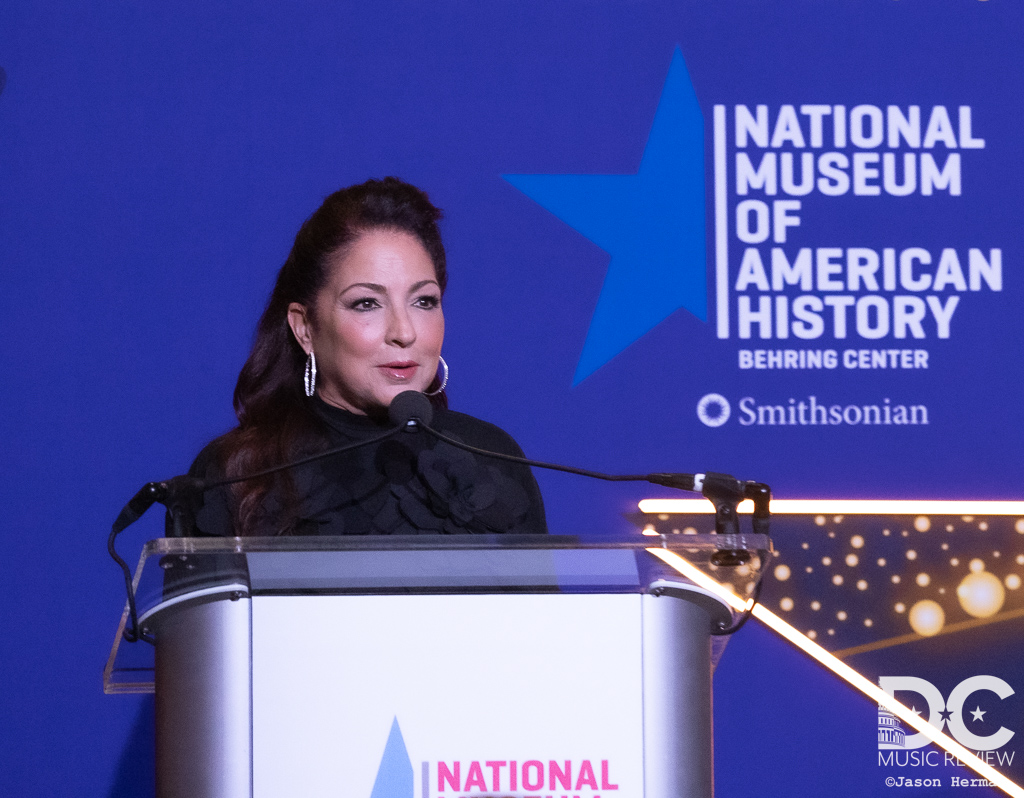
Gloria Estefan
Gloria Estefan graciously and emphatically accepted this national honor. “I am speechless. Honestly, while wearing that dress in the exhibit for 'Rhythm Is Going To Get You' this was not in my thoughts or dreams. I came here when I came to the United States when I was two years old. My father brought us here to live in freedom because he knew what was facing our homeland. And this country opened its arms to us, allowed us to live our dreams, and told us that we could. Sometimes, people in the industry would tell us that we couldn't. We held tight to who we are culturally. I think that that's what allowed us to be different and to break through. There are many, many incredibly talented musicians that are out there doing the thing, all of which deserve a great amount of recognition and might possibly never get to feel what it's like to be a part of the Smithsonian. To them, I offer my hopes that they continue to do what they do because music really unites us throughout the world. I've been able to experience, like others, firsthand the connection that music makes, and that is a truly wonderful thing. So thank you so much for honoring me in this incredible way, and thank you, Emilio, for making me a singer.”

Gloria Estefan
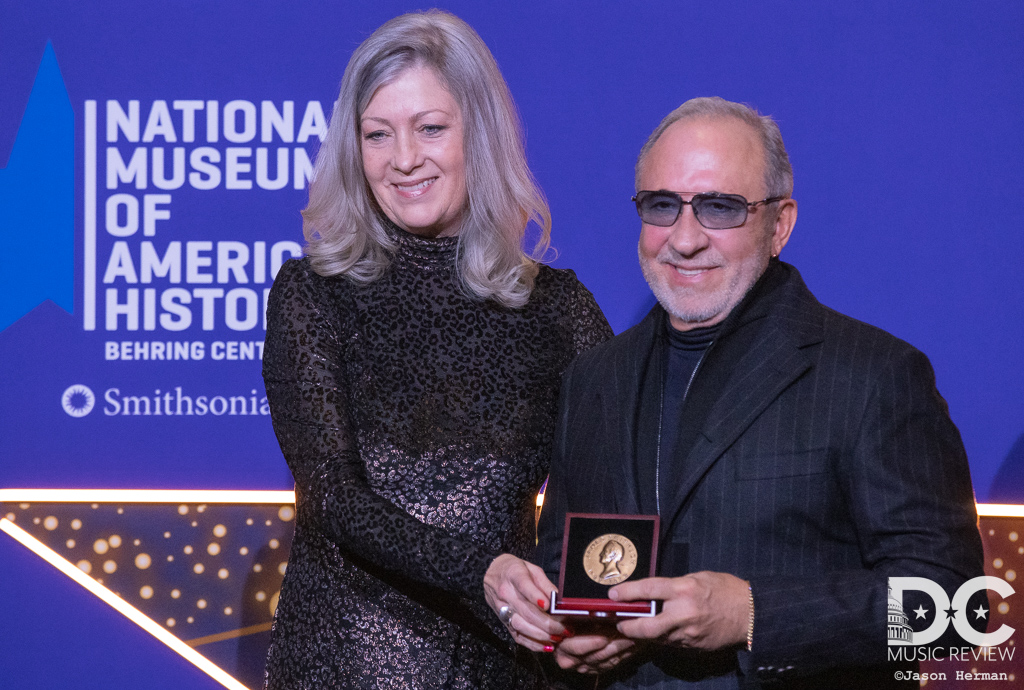
Dr. Anthea M. Hartig and Emilio Estefan
Dr. Hartig then introduced Emilio Estefan. Hartig presented Emilio Estefan his award and concluded her remarks by thanking Emilio for “his embodiment of American creativity through the expression of music and the arts for valuing entrepreneurship, innovation, and freedom for his foresight and persistence and infusing Latin rhythms into the American Songbook, thereby transforming contemporary entertainment. For his commitment to the humanities and philanthropy.”

Dr. Anthea M. Hartig and Emilio Estefan
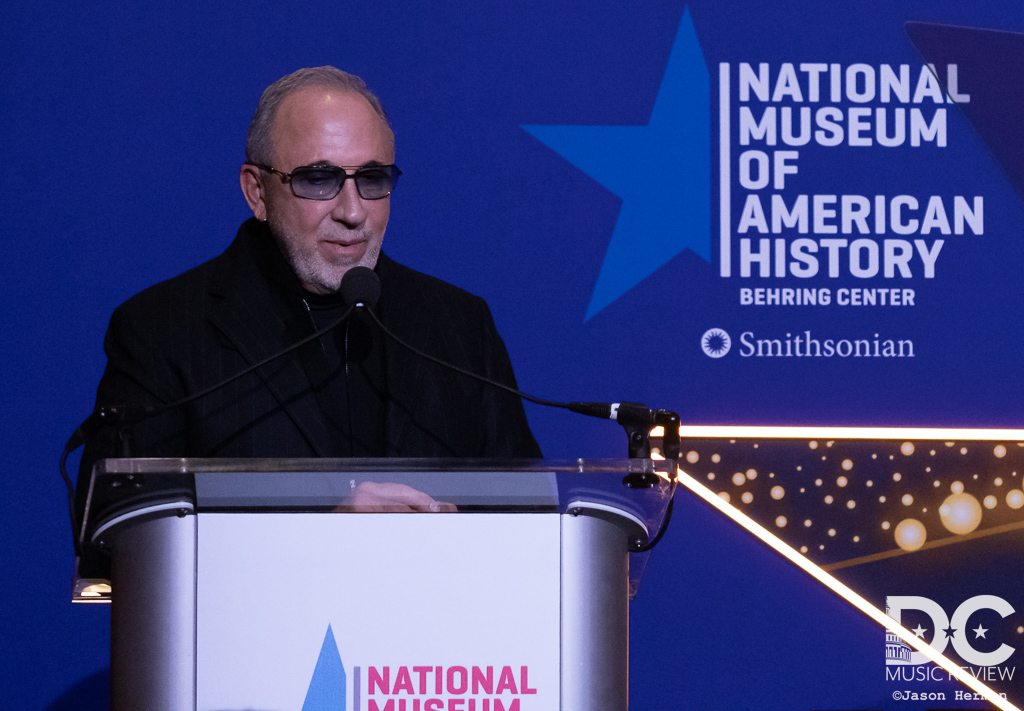
Emilio Estefan
Emilio Esteves would accept the award with a humble and heartfelt acceptance speech. “When we started, they said our sound was good but we would have to change our last names but we didn't do that. Because I remembered that we live in the best country in the whole world and dreams come true. We are lucky and blessed to live in America. I like to say something in my native language … (continues in Spanish). God bless America, thank you for.”
The American musical landscape, if not the global landscape, is richer for Gloria and Emilio Estefan's music and philanthropic contributions.

Emilio Estefan
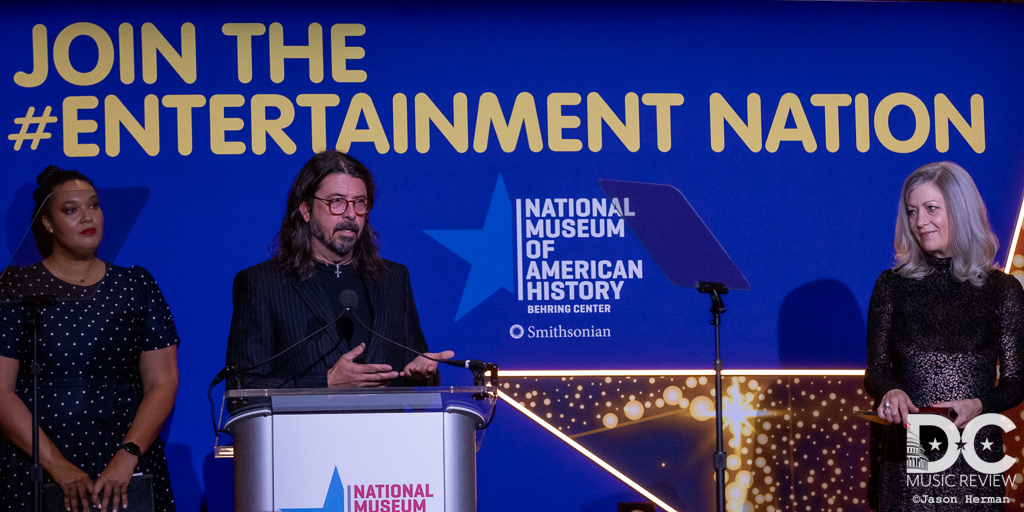
David Grohl with Dr. Krystal Klingenberg (L) and Dr. Anthea M. Hartig (R)
Dr. Krystal Klingenberg, presenter and curator at the Smithsonian's National Museum of American History, described Dave Grohl as "a history of contemporary rock and roll in of itself" and "he is the living embodiment of how musical talent combined with perseverance and curiosity can deliver music to everyone." Director Hartig would also speak a few words about Grohl and talk of her connection with Grohl’s time living in Seattle as she too was a "left coast girl" and how his music during the time of Nirvana had an impact on her as well as an entire generation. Hartig would also point out that Grohl was a DC Area Native, which drew a large hometown applause.

David Grohl with Dr. Krystal Klingenberg (L) and Dr. Anthea M. Hartig (R)
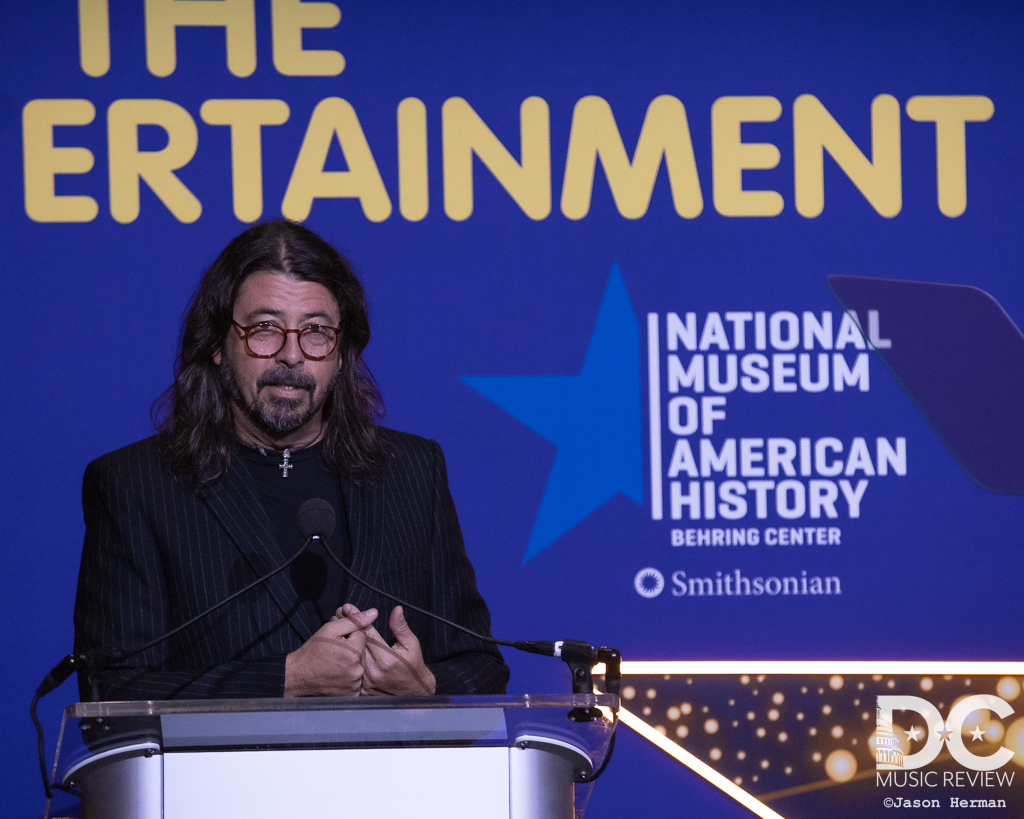
Dave Grohl
Grohl started his speech by thanking the audience and saying, "as was mentioned earlier, I am a DC Area Native, so this award holds a lot more weight than some of the others." After more cheers and acknowledgement by a hometime crowd, Grohl continued. "I think that having grown up here and spent so much time in the Smithsonian over the years. Whether it was school field trips when I was a kid or my mother, who was a public school teacher and who would have the summers off, we would visit the Smithsonian. On those terribly hot and humid days, we would escape the heat by just coming to the Smithsonian for the air conditioning. But in doing that, we got to grow up here and experience so much culture and so much art. We realized that all of the things here at the Smithsonian, you really do lay the foundation for the dreams that you have in your life. Coming here today, with all of these amazing people who I've just met, I started to realize that this is a community of artists and musicians. In here, we have a place to celebrate a real community that goes back hundreds of years. So I'm honored to be here, and I share this award with all the musicians because it is this community."

Dave Grohl
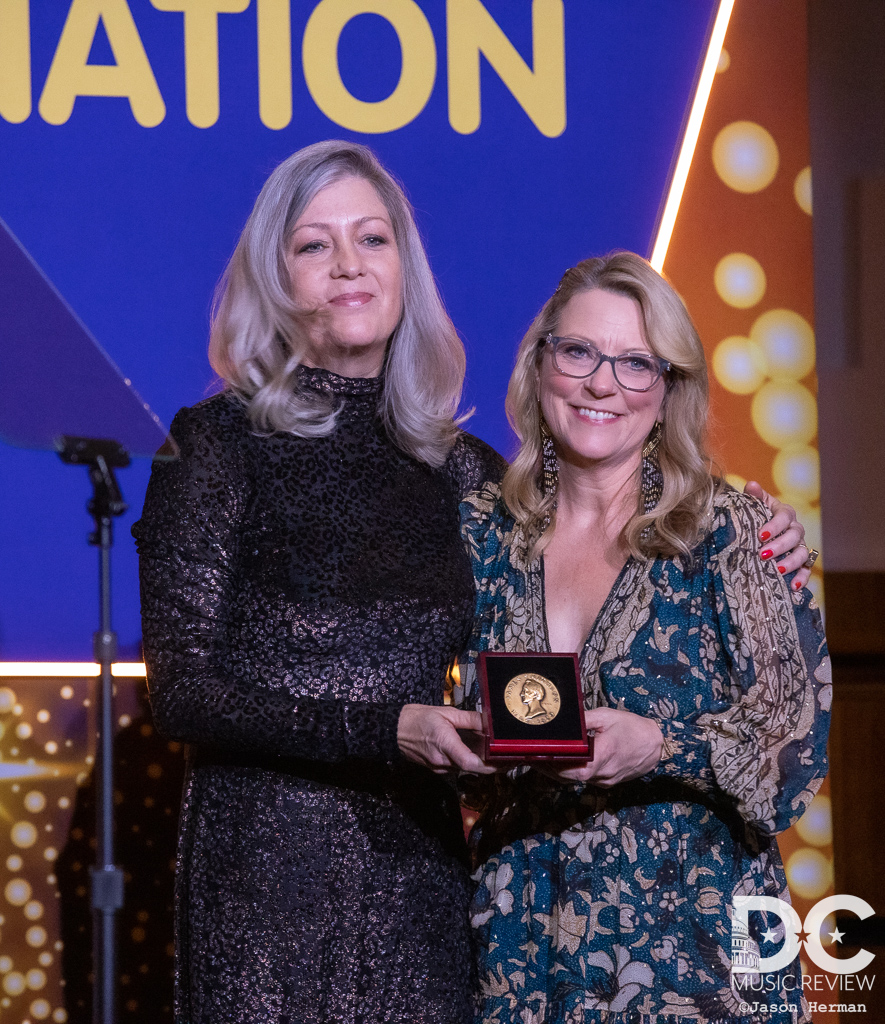
Dr. Anthea M. Hartig and Susan Tedeschi
Directory Hartig would introduce Susan Tedeschi next. Hartig honored Tedeschi and praised her for the "embodiment of the American experience for music. For infusing the American soundtrack with songs that transcend from grief to joy. For staying true to her artform - soulful vocals and guitar expressions of the blues, and for using her voice to share stories of hope in advocating for a better world."
Susan Tedeschi, the last honoree to speak, also had the most to say by lovingly integrating, acknowledging, and adding to key some points made by Gloria Estefan, Emilio Estefan, and Dave Grohl. Susan Tedeshi has won a Grammy Award for Best Blues Album with Tedeschi Trucks Band in 2012 and has received six Blues Music Awards. This award was different as it was the first award at the national level for Tedeschi and her acceptance speech showed the impact this award had made on her. Her speech was filled with emotion and gratitude for those who influenced her along the way.

Dr. Anthea M. Hartig and Susan Tedeschi

Susan Tedeschi
"I am also speechless, not only just because this is such an incredible honor but because, like you said, so lovely Dave - that it is a community. As musicians, we are all tied together. I was hugely influenced by you, Gloria, such a beautiful, strong woman, and your amazing husband. And now, I have a family with my husband, and it's an incredible gift. I also know how lucky I am to be able to be raised in the United States. We get to tour around the world, and it is an incredible gift. And not only just to be an American citizen but to be a woman and to be able to follow your dreams and to do things that people said girls really can't do. I was told "girls can't play guitar," so I started playing guitar just to prove the point that women can play guitar. I want to thank my parents for raising me in a way where I could be a musician and an artist and they always supported me. My brothers who told me I wasn't a good singer when I was little so it pushed me harder. It made me work harder. Don't let people tell you you can't do what your dreams are because you can, and I've learned that living here in the United States. I also have to thank all the teachers that made it possible, especially the music teachers. My first music teacher was my great-aunt, Josephine Sabino, who was an opera singer, and she taught me how to breathe when I was ten years old properly so I could be heard all the way at the back of the room without a microphone when I was singing. I want to thank Dennis Montgomery III, who was my gospel choir teacher with the Reverence Gospel Ensemble at Berklee School of Music, for giving me the belief that I could actually play blues and gospel music and that music does transcend color and race, and that it doesn't matter, we're all the same. We are all the same inside, and I have to try to remind myself that not everybody understands that. I'm trying to make that very apparent with what we do in our band. Our band is very diverse, with so many talented musicians. We are a 12-piece band, and we come from all walks of the world here in the United States. I have to thank them, my whole band. And Pearl Layton, also an opera singer, who taught me how to sing. And of course, all the people that you learn from that become part of you and your sound. Everyone from Mahalia Jackson, Aretha Franklin, Linda Rondstadt, to the Allman Brothers Band. I toured with the Allman Brothers Band and met my husband - so thank you to the Allman Brothers Band, they changed my life. To Willie Nelson and B.B. King for taking me under their wing and giving me the opportunities that they did. And Buddy Guy and Toots Hibbert from Toots & the Maytals for letting me record and live my dreams with all these amazing musicians. It has been such an honor. And it's an honor to be given the James Smithson award, he was an incredible scientist. I always wanted to be a scientist, but I didn't know if I should go into marine biology or music. I'm glad I chose music. But at the same time, I'm really blessed that people have the opportunity to do whatever it is that you dream to do and that if you work hard enough, you can do it. Thank you so much. It's been an incredible honor. Not only to me, my band, my family, and to all my musician friends that I've got to play with over the years. Thank you so much for your contributions to music." DC Music Review was able to talk with Susan Tedeschi after the ceremony and told her how so many of her fans knew that she is a national treasure and how extraordinarily happy we all are now that she is officially recognized as one.

Susan Tedeschi
After the award ceremony, honorees and their families gathered for photos and photos and enjoyed a reception. Each honoree radiated with delight and satisfaction and gleefully displayed their award for all to see.
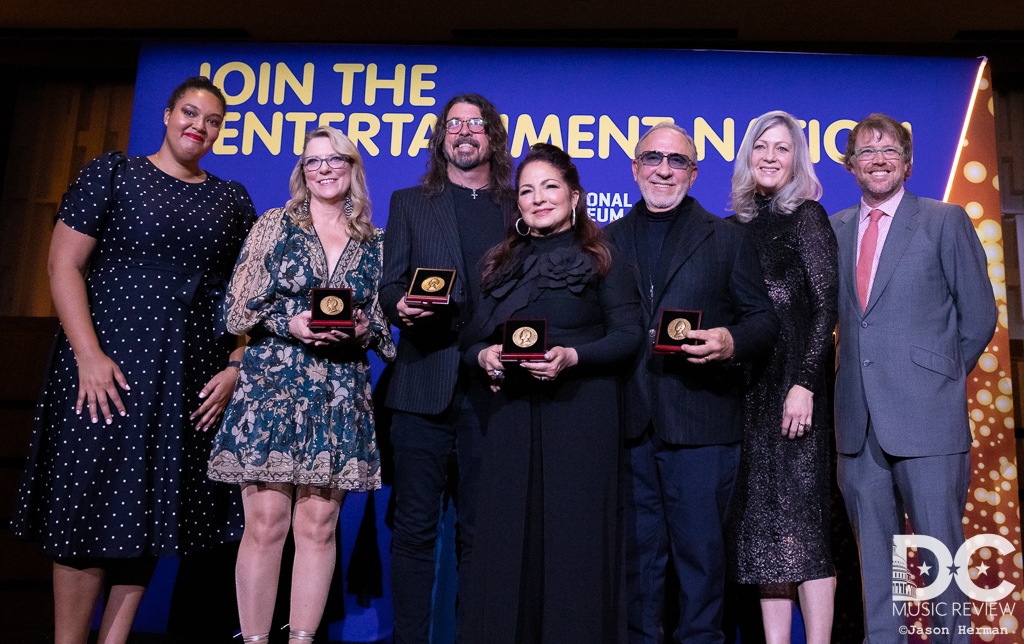
The honorees and presenters (L-R: Dr. Krystal Klingenberg, Susan Tedeschi, Dave Grohl, Gloria Estefan, Emilio Estefan, Dr. Anthea M. Hartig. Dr. John Troutman)
Despite the gravitas of this award, the ceremony itself was a small gathering with less than one hundred individuals gathered at the National American History Museum beside this breathtaking new exhibition hall. DC Music Review finds itself very fortunate to be able to attend an award ceremony and we hope more fans can congratulate the honorees for this award and see the looks of radiating joy return to their faces when recalling memories of this award ceremony.
We wish to congratulate all the deserving recipients of the James Smithson Bicentennial Medal. Each recipient has truly enriched the world in which we live in so many ways, and the world is a better place for your contributions on and off the stage.
Although Gloria & Emilio Estefan and Dave Grohl are not currently touring, it is worth noting that Tedeschi Trucks Band will be performing at The Warner Theatre in late February and early March. We certainly look forward to DC Metro Area fans congratulating Susan Tedeschi for her recent medal and lavish praise on this national treasure in 2023.
(Editor Note: Speeches have been altered and condensed for clarity.)
Photo Gallery
Photo Gallery
Photo Gallery
Enjoy photos by our photographer Jason Herman.
Award Ceremony
Ray and Dagmar Dolby Hall of American Culture
These are just a few select images from the new hall. There are thousands of invaluable national treasures in this hall and we recommend visiting this exhibit. For just a sample of what you will expect, please read and watch the video in this CBS News Article.
Social Media Posts
Social Media Posts
Social Media
Related Articles
Related Articles
Related Articles
